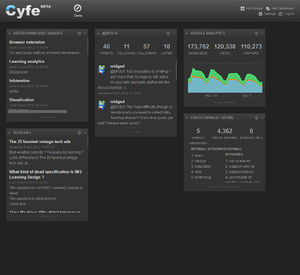Infotention
Introduction
Infotention is a word coined by Howard Rheingold, a pioneer of of virtual online communities. Infotention is a type of digital literacy and it refers both to the invidual's capacity of synthesis and critical thinking, and collective intelligence.
“Infotention a word I came up with to describe the psycho-social-techno skill/tools we all need to find our way online today, a mind-machine combination of brain-powered attention skills with computer-powered information” (Mindful Infotention: Dashboards, Radars, Filters, by the Howard Rheingold, SFGate, 2009).
See also:
- other links in the Knowledge and idea management category.
Software
A wide range of software could be used to manage and process information.
Tools for processing
I.e. the idea is to (re)write and link information.
- Wikis, provided that you know how to link, categorize, etc.
- blogs, citing others, using good tags
- concept maps,
Writing down
The writing down, bookmarking and tagging strategy can become pretty messy after a while, should be combined with one of the above.
- Various note taking tools
- Various links managers, making sure to annotate also
A related solution is to use social software to do this: ““Collective intelligence” and “crowdsourcing” are other emergent terms to capture newfangled forms of collaboration. People who don’t communicate directly as they do in virtual communities can nevertheless aggregate individual efforts to create useful public goods.” (Rheingold, 2012:11)
Monitoring
Using various kinds of dashboards and other aggretator. For example:
- Simple webtops like Netvibes
- Datadisplay oriented Dashboards like Cyfe
- Mindmap-like dashboards like Swiftriver (announced)
- Wiki monitoring tools like Wikisweeper (still vaporware on April 2012 ?).
To the right is a screenshot of a Cyfe dashboard. As you can see you can import RSS feeds, Google Analytics and Webmaster data and some other. This sort of tool can be useful to community and SEO people, usefulness in education and research is limited in our opinion.
Links
By Rheingold
- Infotention. First appearence in public of this word.
- Infotention, managing & information. A commented list of interesting pieces by H. Rheingold
- Concep Map (Cmap) by Rheingold (updated on regular basis).
- A mini course on infotention
- Infotention Part One: Dashboards, Radars, Filters (Video by H.R)
- Infotention Skills: From Information Overload to Knowledge Navigation
Others
- Infotation network
- @Infotention Twitter Network
Bibliography
- Rheingold, Howard (2012). Net Smart: How to Thrive Online, The MIT Press, ISBN 0262017458. Sales blurb from Amazon (US): “Like it or not, knowing how to make use of online tools without being overloaded with too much information is an essential ingredient to personal success in the twenty-first century. But how can we use digital media so that they make us empowered participants rather than passive receivers, grounded, well-rounded people rather than multitasking basket cases? In Net Smart, cyberculture expert Howard Rheingold shows us how to use social media intelligently, humanely, and, above all, mindfully.”
